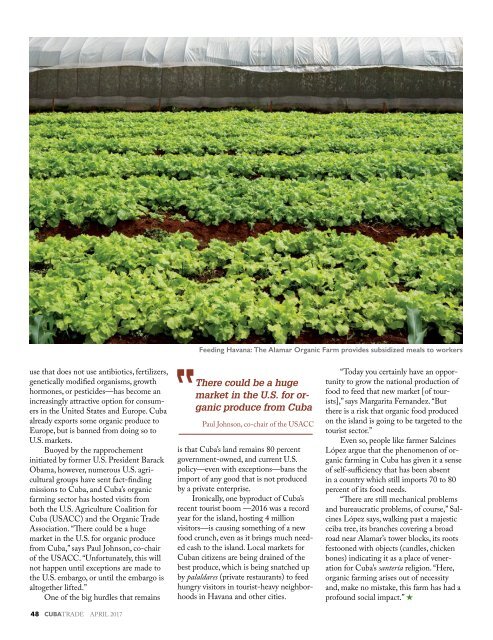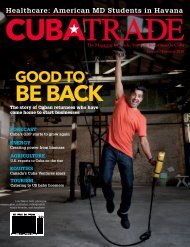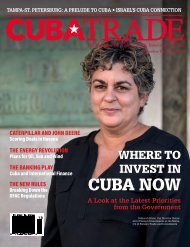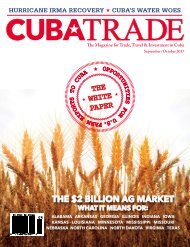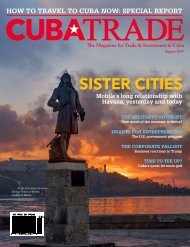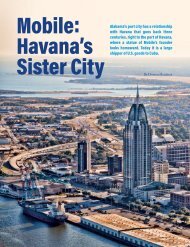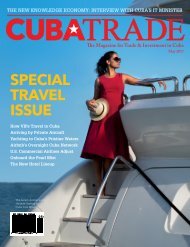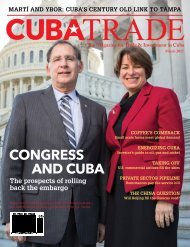CubaTrade-April2017-FLIPBOOK
You also want an ePaper? Increase the reach of your titles
YUMPU automatically turns print PDFs into web optimized ePapers that Google loves.
Don’t miss any issues...<br />
SUBSCRIBE NOW!<br />
TIMELY<br />
TARGETED<br />
EFFECTIVE<br />
Feeding Havana: The Alamar Organic Farm provides subsidized meals to workers<br />
use that does not use antibiotics, fertilizers,<br />
genetically modified organisms, growth<br />
hormones, or pesticides—has become an<br />
increasingly attractive option for consumers<br />
in the United States and Europe. Cuba<br />
already exports some organic produce to<br />
Europe, but is banned from doing so to<br />
U.S. markets.<br />
Buoyed by the rapprochement<br />
initiated by former U.S. President Barack<br />
Obama, however, numerous U.S. agricultural<br />
groups have sent fact-finding<br />
missions to Cuba, and Cuba’s organic<br />
farming sector has hosted visits from<br />
both the U.S. Agriculture Coalition for<br />
Cuba (USACC) and the Organic Trade<br />
Association. “There could be a huge<br />
market in the U.S. for organic produce<br />
from Cuba,” says Paul Johnson, co-chair<br />
of the USACC. “Unfortunately, this will<br />
not happen until exceptions are made to<br />
the U.S. embargo, or until the embargo is<br />
altogether lifted.”<br />
One of the big hurdles that remains<br />
There could be a huge<br />
market in the U.S. for organic<br />
produce from Cuba<br />
Paul Johnson, co-chair of the USACC<br />
is that Cuba’s land remains 80 percent<br />
government-owned, and current U.S.<br />
policy—even with exceptions—bans the<br />
import of any good that is not produced<br />
by a private enterprise.<br />
Ironically, one byproduct of Cuba’s<br />
recent tourist boom —2016 was a record<br />
year for the island, hosting 4 million<br />
visitors—is causing something of a new<br />
food crunch, even as it brings much needed<br />
cash to the island. Local markets for<br />
Cuban citizens are being drained of the<br />
best produce, which is being snatched up<br />
by palaldares (private restaurants) to feed<br />
hungry visitors in tourist-heavy neighborhoods<br />
in Havana and other cities.<br />
“Today you certainly have an opportunity<br />
to grow the national production of<br />
food to feed that new market [of tourists],”<br />
says Margarita Fernandez. “But<br />
there is a risk that organic food produced<br />
on the island is going to be targeted to the<br />
tourist sector.”<br />
Even so, people like farmer Salcines<br />
López argue that the phenomenon of organic<br />
farming in Cuba has given it a sense<br />
of self-sufficiency that has been absent<br />
in a country which still imports 70 to 80<br />
percent of its food needs.<br />
“There are still mechanical problems<br />
and bureaucratic problems, of course,” Salcines<br />
López says, walking past a majestic<br />
ceiba tree, its branches covering a broad<br />
road near Alamar’s tower blocks, its roots<br />
festooned with objects (candles, chicken<br />
bones) indicating it as a place of veneration<br />
for Cuba’s santería religion. “Here,<br />
organic farming arises out of necessity<br />
and, make no mistake, this farm has had a<br />
profound social impact.” H<br />
Everything you need to know on:<br />
Tourism Transportation Agriculture Investments<br />
Energy Manufacturing And much more …..<br />
RECEIVE 11 ISSUES DELIVERED DIRECTLY TO YOU FOR ONLY<br />
$29.99<br />
That’s like getting 6 issues FREE! *<br />
Subscribe online at cubatrademagazine.com<br />
48 CUBATRADE APRIL 2017<br />
* Newsstands price $5.99 per issue


